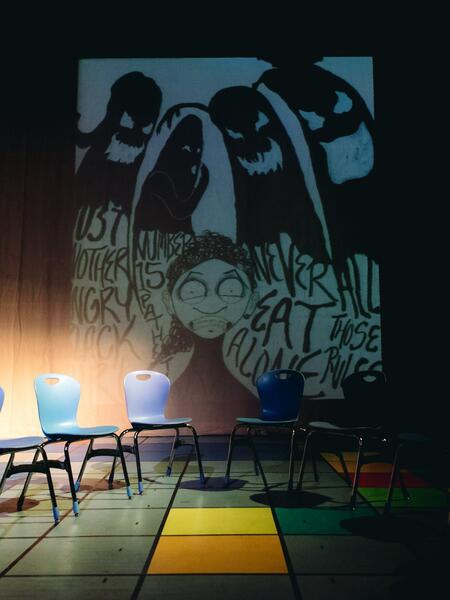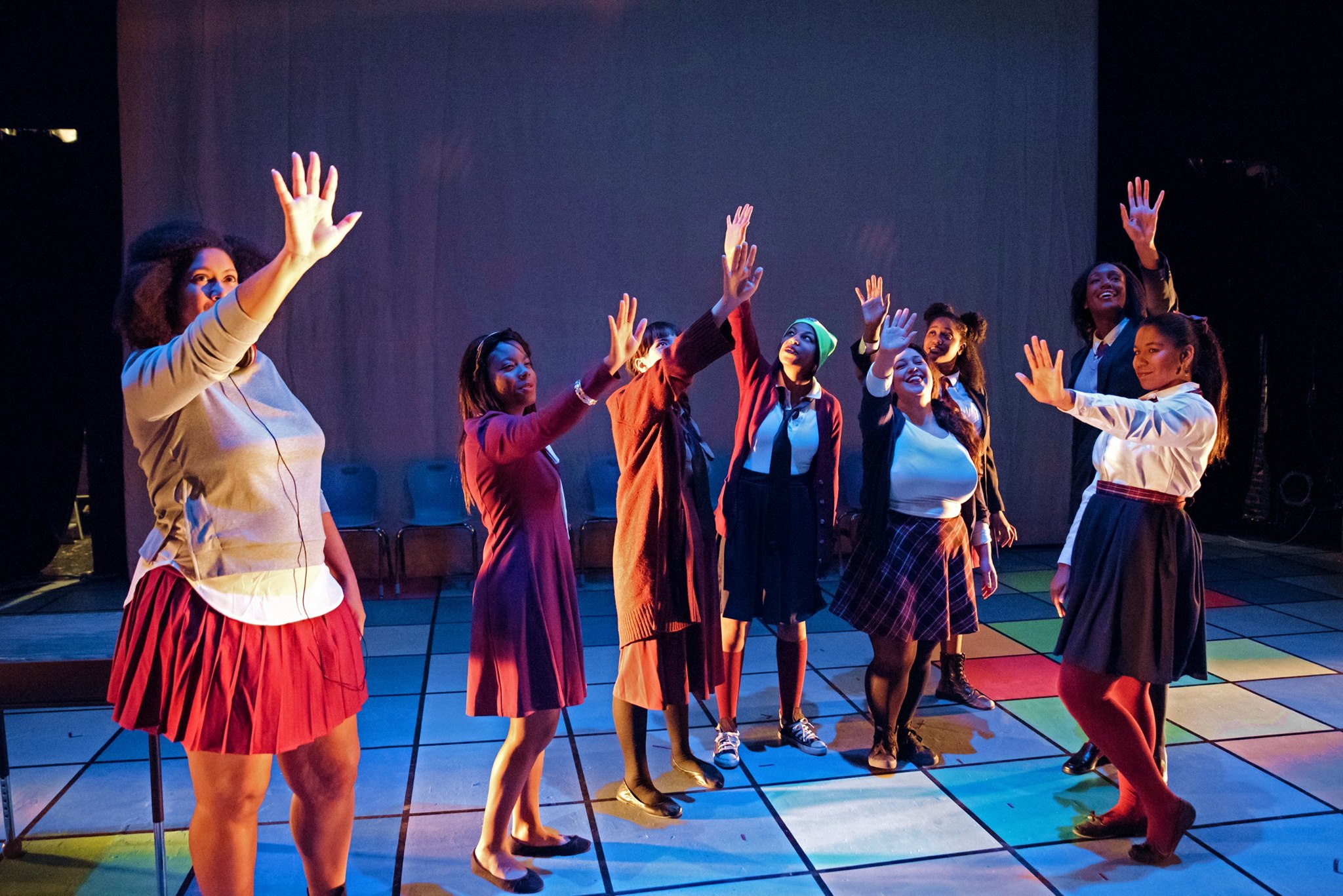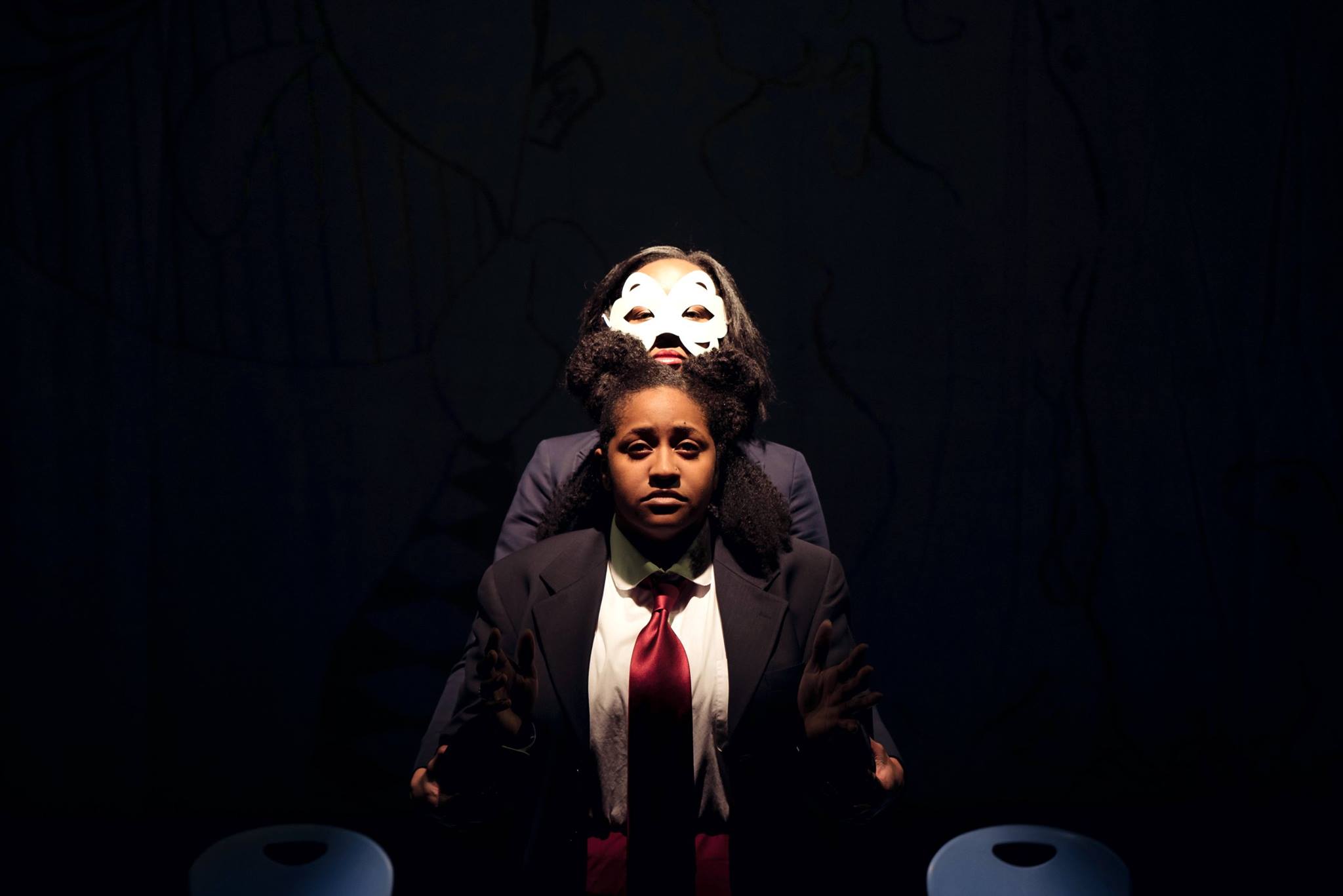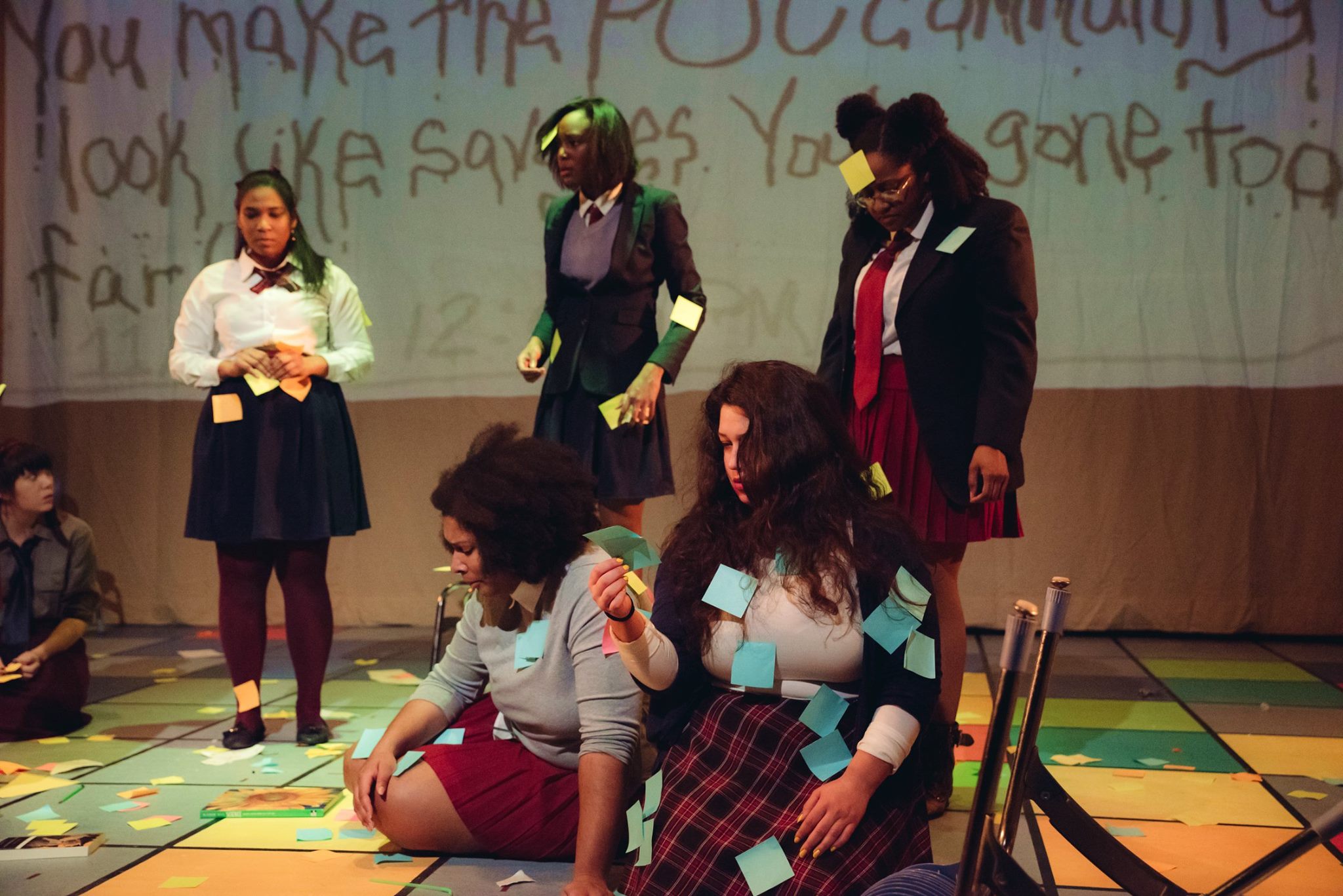"THE GOODIES," a new ensemble-devised piece, directed by Susan Stroupe and produced by Iron Crow Theatre, closed on December 10, 2017. THE GOODIES is a modern re-telling of the Salem Witch Trials, using the high-pressure world of a high school and systemic racism as metaphors to bring the complex history into our modern imaginations. Devised and written by a cast of 8 women of color, THE GOODIES reframed the narrative of history to center on the teenage girl accusers, to give them a chance to be seen as more than hysterical liars. In that process, the show both indicts and invites the audience to look for where we are all complicit, where we all dehumanize, and how we might use history to learn for the future.
From Stroupe's Director's Notes:
“The past is never dead. It’s not even past.” William Faulkner’s simple wording encompasses the complex breadth and height of America’s relationship to its own foundation, and few events from our early days continue to haunt our imaginations more than the Salem Witch Trials. As we embarked on this devising journey, we discovered that as much as we believe we have distanced ourselves from those literal dark days, the Puritans are much closer than we think. We often associate the Puritans only with their theology, but in reality their philosophy of work and behavior is so close to our current desire to prove we are living a good life, that some phrases in the primary sources of our research could have been written by contemporary wellness bloggers.
We also discovered that at the root of these events, so often explained away by a simple single source, stemmed in many ways from the complex pain of teenage girls wanting to have a voice in their society and being censored by authority figures. The difficult reality was that their silencing and censoring wasn’t really because of lack of belief in them, but because their truth would bring the entire precarious social contract of Puritan society to its knees. So we started from a place of believing those girls. We found a deep kinship between those teenage girls of Salem and teenage girls of color in our own time, and grew this story from that seed.
In his play The Crucible, Arthur Miller simplified this history by making it about a Good Man (aged down), a Vindictive Teenage Girl (aged up), and government too blinded by doctrine to see what was right in front of them. We do not intend to nullify Miller’s great work, but to add to it, and to suggest that if we continue to simplify our past, we will forever be haunted by it in the present.
From Stroupe's Director's Notes:
“The past is never dead. It’s not even past.” William Faulkner’s simple wording encompasses the complex breadth and height of America’s relationship to its own foundation, and few events from our early days continue to haunt our imaginations more than the Salem Witch Trials. As we embarked on this devising journey, we discovered that as much as we believe we have distanced ourselves from those literal dark days, the Puritans are much closer than we think. We often associate the Puritans only with their theology, but in reality their philosophy of work and behavior is so close to our current desire to prove we are living a good life, that some phrases in the primary sources of our research could have been written by contemporary wellness bloggers.
We also discovered that at the root of these events, so often explained away by a simple single source, stemmed in many ways from the complex pain of teenage girls wanting to have a voice in their society and being censored by authority figures. The difficult reality was that their silencing and censoring wasn’t really because of lack of belief in them, but because their truth would bring the entire precarious social contract of Puritan society to its knees. So we started from a place of believing those girls. We found a deep kinship between those teenage girls of Salem and teenage girls of color in our own time, and grew this story from that seed.
In his play The Crucible, Arthur Miller simplified this history by making it about a Good Man (aged down), a Vindictive Teenage Girl (aged up), and government too blinded by doctrine to see what was right in front of them. We do not intend to nullify Miller’s great work, but to add to it, and to suggest that if we continue to simplify our past, we will forever be haunted by it in the present.
-
 The Goodies 1.jpgThe ensemble cast of THE GOODIES. From left to right: Dana Woodson, Christine Canady, Elizabeth Ung, Rachel Reckling, Jess Rivera, Danielle Harrow, Alex Reeves, Aladrian Crowder Wetzel. The main narrative was bookended by a prologue and an epilogue, imitating the Bible's "In the beginning," and Book of Revelations, about the creation and journey of the teenage girl, a nod to the devotion of the Puritans (and of our modern times) to mythology and doctrinal texts to form our moral compasses.
The Goodies 1.jpgThe ensemble cast of THE GOODIES. From left to right: Dana Woodson, Christine Canady, Elizabeth Ung, Rachel Reckling, Jess Rivera, Danielle Harrow, Alex Reeves, Aladrian Crowder Wetzel. The main narrative was bookended by a prologue and an epilogue, imitating the Bible's "In the beginning," and Book of Revelations, about the creation and journey of the teenage girl, a nod to the devotion of the Puritans (and of our modern times) to mythology and doctrinal texts to form our moral compasses. -
 The Goodies 2.jpgEach actor created their own "Goodie" character, a teenage girl at the center of the narrative. In adapting the Salem history, each actor discovered how their character would be haunted by the world around them, an intersection of racism, sexism, and dogmatic adherence to what it means to be "good."
The Goodies 2.jpgEach actor created their own "Goodie" character, a teenage girl at the center of the narrative. In adapting the Salem history, each actor discovered how their character would be haunted by the world around them, an intersection of racism, sexism, and dogmatic adherence to what it means to be "good." -
 The Goodies 3.jpgEach "ghost" was accompanied by a projected illustration by Justin Johnson, giving the audience a glimpse into how the specters of the girls' worlds lived in their imaginations.
The Goodies 3.jpgEach "ghost" was accompanied by a projected illustration by Justin Johnson, giving the audience a glimpse into how the specters of the girls' worlds lived in their imaginations. -
 The Goodies.jpgBecause we set the world in a modern high school, the role of social media was a huge character in the narrative, and a metaphor for the "new world" from the times of Salem, as the internet for us is also dark, unknown, and its laws are still being written. In order to bring the effects of social media into a theatrical form, we used post-it notes as a literal representation of social media posts, a clever gimmick that turned deadly when the Goodies later become inundated with posts they cannot control.
The Goodies.jpgBecause we set the world in a modern high school, the role of social media was a huge character in the narrative, and a metaphor for the "new world" from the times of Salem, as the internet for us is also dark, unknown, and its laws are still being written. In order to bring the effects of social media into a theatrical form, we used post-it notes as a literal representation of social media posts, a clever gimmick that turned deadly when the Goodies later become inundated with posts they cannot control.



